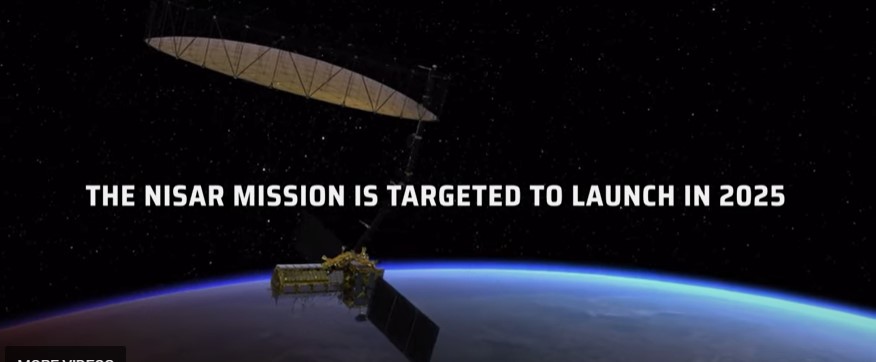
(Photo : nisar.jpl.nasa.gov)
Corrective Actions Push NISAR Launch to 2025
- The NASA-ISRO Synthetic Aperture RADAR (NISAR) mission, a joint venture between NASA and ISRO, is now expected to launch in March 2025.
- The Union Minister informed that the government recently approved the Chandrayaan-4 and Venus Orbiter Mission.
- In international relations, the U.S.-China relationship is fraught with tensions, and in technology, they are undergoing a process of "decoupling".
- India is emerging as a key player in the Indo-Pacific region, and significant advances are being made in the field of biotechnology.
The much-anticipated NASA - ISRO Synthetic Aperture RADAR (NISAR) mission, a joint venture between NASA and ISRO, is now expected to launch in March 2025, according to Union Minister of State for Science and Technology Jitendra Singh. The mission, which was initially scheduled for the first half of 2024, was delayed due to necessary corrective actions on the 12-meter Radar Antenna Reflector. The issues were detected during the assembly, integration, and testing phase by NASA experts. After rectification in the US, the radar was delivered to ISRO by NASA in October. Currently, the radar is being re-integrated with the satellite and undergoing necessary tests.
The Union Minister further explained that the conditions to launch the satellite are not conducive now due to the eclipse season. He also highlighted that space exploration missions take an exhaustive time cycle that includes conceptualisation, design, development of prototype, qualification and flight model and numerous tests, design iterations, supply chain, and extensive reviews of several complex and Indigenous technologies.
The Union Minister also informed that the government recently approved the Chandrayaan-4 and Venus Orbiter Mission that would further the capabilities in various elements of satellite realisation. The Chandrayaan-4 mission envisages extraction and return of lunar samples back to Earth. The Venus Orbiter Mission aims to successfully orbit Venus and better understand the Venusian surface and subsurface, atmospheric processes, and influence of the Sun on Venusian atmosphere.
Global Relations and Technological Decoupling
In the context of international relations, the U.S.-China relationship is fraught with frictions and tensions. Beijing's military maneuvering around Taiwan, its declaration of a no-limits partnership with Russia, and its pursuit of a far-reaching conventional and nuclear arms buildup have all contributed to the strained relationship. The U.S. has responded with economic measures aimed at countering China, measures that deny China access to advanced U.S. technologies, provocative visits by congressional leaders to Taiwan, a diplomatic initiative to strengthen U.S. alliances in Asia, and an arms buildup of its own.
In the realm of technology, the U.S. and China are undergoing a process of decoupling, with the U.S. imposing export controls to restrict the transfer of sensitive goods, services, and data to foreign countries. This has significant implications for the global tech industry and the future of international cooperation on AI.
India's Role in the Indo-Pacific and Advances in Biotechnology
In the Indo-Pacific region, India is emerging as a key player, with its approach to the new construct being defined and laid out. New Delhi has become a key pillar of the Indo-Pacific architecture, and it has put forward its own vision through Prime Minister Narendra Modi's speech at the Shangri-La Dialogue in 2018.
In the field of biotechnology, significant advances are being made, with breakthroughs occurring in genome editing, gene drives, and synthetic biology. The field's principal breakthroughs have occurred in genome editing, gene drives, and synthetic biology. Current trends suggest there will be a profusion of biotechnology products that are significantly different in type, scope, and complexity than previous ones. Lower barriers to access have opened the field to more and more actors.
* This is a contributed article and this content does not necessarily represent the views of btin.co.in









